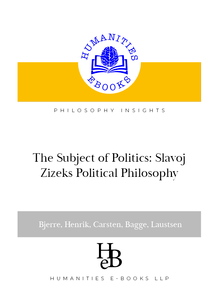-
 Univers
Univers
-
 Ebooks
Ebooks
-
 Livres audio
Livres audio
-
 Presse
Presse
-
 Podcasts
Podcasts
-
 BD
BD
-
 Documents
Documents
-
- Cours
- Révisions
- Ressources pédagogiques
- Sciences de l’éducation
- Manuels scolaires
- Langues
- Travaux de classe
- Annales de BEP
- Etudes supérieures
- Maternelle et primaire
- Fiches de lecture
- Orientation scolaire
- Méthodologie
- Corrigés de devoir
- Annales d’examens et concours
- Annales du bac
- Annales du brevet
- Rapports de stage
La lecture à portée de main
124 pages
English
Découvre YouScribe en t'inscrivant gratuitement
Je m'inscrisThe Subject of Politics: Slavoj Zizeks Political Philosophy , livre ebook
Découvre YouScribe en t'inscrivant gratuitement
Je m'inscris
Obtenez un accès à la bibliothèque pour le consulter en ligne
En savoir plus
En savoir plus
124 pages
English
Obtenez un accès à la bibliothèque pour le consulter en ligne
En savoir plus
En savoir plus

Description
An Introduction to Slavoj Zizek's Political Philosophy with a distinctive focus on Subjectivity.
Sujets
Informations
| Publié par | Humanities eBooks |
| Date de parution | 11 janvier 2021 |
| Nombre de lectures | 0 |
| EAN13 | 9781847601698 |
| Langue | English |
Informations légales : prix de location à la page 0,0000€. Cette information est donnée uniquement à titre indicatif conformément à la législation en vigueur.
Extrait
Philosophy Insights General Editor: Mark Addis
The Subject of PoliticsSlavoj Žižek’s Political Philosophy
Henrik Jøker Bjerre & Carsten Bagge Laustsen
“... ideology is already at work in everything we experi-ence as ‘reality’...”
For advice on use of this ebook please scroll to page 2 HEB☼FOR ADVICE ON THE USE OF THIS EBOOK PLEASE SCROLL TO PAGE 2
Readingt
*This book is designed to be read in single page view, using the ‘ît page’ command. *To navigate through the contents use the hyperlinked ‘Book-marks’ at the left of the screen. *To search, click the magnifying glass symbol and select ‘show all results’. *For ease of reading, use <CTRL+L> to enlarge the page to full screen, and return to normal view using < Esc >. *Hyperlinks (if any) appear in Blue Underlined Text.
Permissions
Your purchase of this ebook licenses you to read this work on-screen. No part of this publication may be otherwise reproduced or trans-mitted or distributed without the prior written permission of both the copyright owner and the publisher. You may print one copy of the book for your own use but copy and paste functions are disabled. Making or distributing copies of this book would constitute copyright infringement and would be liable to prosecution.
Thank you for respecting the rights of the author.
The Subject of Politics: Slavoj Žižek’s Political Philosophy
Henrik Jøker Bjerre &Carsten Bagge Laustsen
HEB ☼ Humanities-Ebooks, LLP
Copyright
© Henrik Jøker Bjerre and Carsten Bagge Laustsen, 2010
The Authors have asserted their right to be identiîed as the author of this Work in accordance with the Copyright, Designs and Patents Act 1988.
This edition published byHumanities-Ebooks, LLP, Tirril Hall, Tirril, Penrith CA10 2JE
ISBN 978-1-84760-169-8 Pdf ISBN 978-1-84760-170-4 Kindle
Contents
A Note on the Authors
Acknowledgements
Introduction
Chapter 1. Lacanian interventions: Psychoanalysis as a theory of society The unconscious Back to Lacan Discourse analysis or critique of ideology You remind me of Emmanuel Ravelli! Chapter 2. The ideological fantasm: Žižek’s sociology We know very well… The mirror stage as critique of ideology Fetishism as a political form The two sides of the social bond Chapter 3. A world out of joint: Žižek’s diagnosis of contemporary society The fall of the Father Nationalism and ethnic conicts Multiculturalism and racism Terrorism and 11 September
7
8
9
16 16 21 24 26 32 34 42 46 49
54 55 61 65 71
Chapter 4. The revolutionary subject: Žižek’s ethical and political horizon I think not, therefore I am The Proletarian It is theeconomy, stupid! Postmodernism as the new ideological superstructure of capitalism St. Paul on the barricade Communism, of course! Chapter 5. Did somebody say totalitarianism? Žižek’s critics. The rebellion against the father Passions of the real The useful idiot Bibliography
77 79 86 93
96 99 102
106 107 110 117 120
A Note on the Authors
Henrik Jøker Bjerre is Assistant Professor at the Department of Philosophy and History of Ideas, Aarhus University, Denmark. His main research interests are moral philosophy, sociology and psychoa-nalysis. His publications includeKantian Deeds(Continuum, 2010).
Carsten Bagge Laustsen is Associate Professor at the Department of Political Science, Aarhus University, Denmark. His main research interests are terrorism, political theology, political thought and modern social theory. He has previously publishedThe Culture of Exception. Sociology Facing the Camp2005, with Bülent Diken) (Routledge, andSociology through the Projector(Routledge, 2008, with Bülent Diken).
Acknowledgements
The authors wish to thank Stuart Pethick for a much appreciated proof reading of the manuscript and Mark Addis and Richard Gravil at HEB for their patience and good advice.
Introduction
Professor James Miller once remarked on Slavoj Žižek’s effect on American academia that, ‘He was like Diogenes the Cynic para-chuted into the American academy’ (Mead 2003: 2). Like Diogenes in ancient Greece, who lived in a barrel and openly displayed his disre-spect for any public authority, Žižek sometimes causes a stir because of his provocative statements and unorthodox approaches to the clas-sics of philosophy. He is a philosopher, political thinker, psychoana-lyst and sociologist. He is one of the most requested intellectuals in the world, not least because of his poignant and often surprising diag-noses of contemporary society and his very entertaining style. By analysing everything from differences in the construction of toilets in different cultures to mainstream Hollywood productions, and from Hegel’s logics to the latest landmarks in neuroscience, Žižek has cre-ated a unique ability to keep his audience spellbound. The enjoyment in reading or listening to Žižek, however, is double-edged. Often you are having an excellent time, while at the same time being told that you are petty bourgeois, narrow minded, racist, evil, or perverted. This somewhat sadomasochistic relation to his audience and readers has turned Žižek into something as rare as an academic superstar. He is a rare showman and constantly surprises by turn-ing a problem upside down (‘I agree with you, but my point would be much more radical andexactlythe opposite’), he draws on end-less jokes and examples, and he both writes and talks in an almost manic fashion. ‘I discovered, when I was in analysis, that if I stopped talking, the analyst would ask me very unpleasant questions’, as he explained at a conference in Sweden in 2002. ‘Therefore, I usually continue without pause’. Slavoj Žižek was born in Ljubljana, Slovenia, on 21 March 1949. He grew up in Tito’s Yugoslavia, and received his education from the University of Ljubljana, where he graduated with an MA in philo-
10
The Subject of Politics
sophy in 1975 with a thesis on post-structuralist French thinkers, after having already published his îrst book during his education. In spite of his obvious talent, however, he had to settle for an outsider position from the beginning. Because of his charismatic and some-what rebellious style and his explicit interest in French philosophy, the Yugoslavian authorities were simply uncomfortable with letting him teach, and after serving military duty he had to seek refuge in the Institute of Sociology, via the inuence of some friends. In retro-spect, however, Žižek has described his difîculties in the years from 1975 to 1979 as a stroke of luck: ‘I think that if I were to have got a job at that point, I would now be a poor stupid unknown professor in Ljubljana, probably dabbling in a little bit of Derrida, a little bit of Heidegger, a little bit of Marxism and so on’ (Daly/ Žižek 2004: 32–33). The difîcult conditions and the opportunity to continue his work at the sociological institute also forced Žižek to engage more systematic-ally with other areas of thought, such as the sociological and political. Having delivered his Ph.D. thesis in 1981, he moved to Paris to inves-tigate the philosophical and psychoanalytical milieu around Jacques Derrida and Jacques Lacan. Lacan died in 1981, but Žižek nonethe-less obtained a very direct training in psychoanalysis through Lacan’s son-in-law, Jacques-Alain Miller. Under his supervision, Žižek wrote his second dissertation, this time within psychoanalysis. After returning to Slovenia, he participated actively in the Slovenian opposition in the years leading up to independence in 1990. A number of philosophers, including Mladen Dolar, Miran Božovič, Renata Salecl, Rado Riha and Jelica Šumič-Riha, participated in both politi-cal debates and groundbreaking philosophical initiatives through the Society for Theoretical Psychoanalysis (ANALECTA) in Ljubljana. The circle had a broad intellectual appeal and ties to other îelds, like the somewhat enigmatic rock bandLaibachGerman word for (the Ljubljana), who exhibited the nationalist overtones of the time in gro-tesque forms. Žižek ran as a candidate for the presidential elections in 1990 and made an unusual and lively philosophical impact on sev-eral of the debates during the campaign. Together with a handful of younger researchers, this group is still today sometimes referred to as
-
 Univers
Univers
-
 Ebooks
Ebooks
-
 Livres audio
Livres audio
-
 Presse
Presse
-
 Podcasts
Podcasts
-
 BD
BD
-
 Documents
Documents
-
Jeunesse
-
Littérature
-
Ressources professionnelles
-
Santé et bien-être
-
Savoirs
-
Education
-
Loisirs et hobbies
-
Art, musique et cinéma
-
Actualité et débat de société
-
Jeunesse
-
Littérature
-
Ressources professionnelles
-
Santé et bien-être
-
Savoirs
-
Education
-
Loisirs et hobbies
-
Art, musique et cinéma
-
Actualité et débat de société
-
Actualités
-
Lifestyle
-
Presse jeunesse
-
Presse professionnelle
-
Pratique
-
Presse sportive
-
Presse internationale
-
Culture & Médias
-
Action et Aventures
-
Science-fiction et Fantasy
-
Société
-
Jeunesse
-
Littérature
-
Ressources professionnelles
-
Santé et bien-être
-
Savoirs
-
Education
-
Loisirs et hobbies
-
Art, musique et cinéma
-
Actualité et débat de société
- Cours
- Révisions
- Ressources pédagogiques
- Sciences de l’éducation
- Manuels scolaires
- Langues
- Travaux de classe
- Annales de BEP
- Etudes supérieures
- Maternelle et primaire
- Fiches de lecture
- Orientation scolaire
- Méthodologie
- Corrigés de devoir
- Annales d’examens et concours
- Annales du bac
- Annales du brevet
- Rapports de stage
Signaler un problème
YouScribe
Le catalogue
Le service
© 2010-2024 YouScribe




















